- Home
- Joy Dettman
Mallawindy
Mallawindy Read online
Joy Dettman was born in Echuca in Victoria and now lives in Melbourne.
Joy, a mother of four, is a full-time writer and a published author of several award-winning stories and the highly acclaimed novels Mallawindy, Jacaranda Blue, Goose Girl, Yesterday’s Dust, The Seventh Day and Henry’s Daughter.
Also by Joy Dettman
MALLAWINDY
JACARANDA BLUE
GOOSE GIRL
YESTERDAY’S DUST
THE SEVENTH DAY
HENRY’S DAUGHTER
mallawindy
JOY DETTMAN
First published 1998 in Macmillan by Pan Macmillan Australia Pty limited
First published 1999 in Pan by Pan Macmillan Australia Pty Limited
St Martins Tower, 31 Market Street, Sydney
Reprinted 1999 (twice), 2001, 2003, 2005
Copyright © Joy Dettman 1998
All rights reserved. No part of this book may be reproduced or
transmitted in any form or by any means, electronic or
mechanical, including photocopying, recording or by any
information storage and retrieval system, without prior
permission in writing from the publisher.
National Library of Australia
cataloguing-in-publication data:
Dettman, Joy.
Mallawindy.
ISBN 0 330 36146 5.
I. Title.
A823.3
This is a work of fiction and all characters in this book are a creation
of the author’s imagination.
Printed in Australia by McPherson’s Printing Group
These electronic editions published in 2007 by Pan Macmillan Australia Pty Ltd
1 Market Street, Sydney 2000
The moral right of the author has been asserted.
All rights reserved. This publication (or any part of it) may not be reproduced
or transmitted, copied, stored, distributed or otherwise made available by any
person or entity (including Google, Amazon or similar organisations), in any
form (electronic, digital, optical, mechanical) or by any means (photocopying,
recording, scanning or otherwise) without prior written permission from the
publisher.
Mallawindy
Joy Dettman
Adobe eReader format 978-1-74197-112-5
Microsoft Reader format 978-1-74197-313-6
Mobipocket format 978-1-74197-514-7
Online format 978-1-74197-715-8
Epub format 978-1-74262-382-5
Macmillan Digital Australia
www.macmillandigital.com.au
Visit www.panmacmillan.com.au to read more about all our books and to buy
both print and ebooks online. You will also find features, author interviews and
news of any author events.
For Cheryl,
who at the age of three became hooked on ‘Once upon a time’,
and who, three decades on, read this tale and demanded
a second and a third and a sixth telling.
I now give you Mallawindy to hold in your hand.
contents
the birth
ellie’s world
malcolm fletcher
jack Burton
school
a very good year
the test
the books
the bankbook
david taylor
the baby
miscast
novel lovers
jack’s party
the gold coast
melbourne
the opalescent gem
narrawee
memories
america calling
going home
lost innocence
the baby
trust
the mouse-wheel
two old men
brief candle
word colour
the telephones
the priest
johnny is home
run for the river
epilogue
the birth
December 1960
‘Take the little ones around to Grandpa. Do as I tell you, Johnny.’ The words were spoken low, but the river picked them up, amplified them, carried them. Pain, mind consuming pain was controlling Ellie Burton, making her careless. She moaned, grasped her stomach, trying to still the unborn one with her will.
Johnny stepped away, his interest centred on the house. Only one small light was visible at the kitchen window. Too feeble, it couldn’t compete with the full moon.
‘For the love of God, will you obey me? Take Liza, and go to Grandpa.’
‘I’m not leaving you, Mum,’ Johnny said.
He was her first born, and too old for his eight years. He’d seen too much; he knew too much. He told her to run when he saw the car slam to a halt against the fence. She should have listened to him. Jack had been to his father’s funeral at Narrawee. It was five hundred miles south, in Victoria, with many hotels on the long road home. Johnny knew. He could read Jack like a book.
‘Fool,’ she whispered. ‘I’m a fool.’
Her father called her a fool. He wanted her and the children home, safe with him, but Ellie had made her vows in the church, before God and half the town. She couldn’t leave Jack, couldn’t admit her marriage was a failure. Couldn’t, or wouldn’t.
Liza whimpered. Ellie’s hand felt for the dangling dummy. She snatched it up, silencing the cry. Not yet eleven months, Liza was too young to be replaced at the breast by the one now fighting free of her womb. ‘Shush,’ she whispered. ‘Hush, bubby. It’s going to be all right.’
The house was a long paddock away, but she could hear him breaking up the kitchen, cursing his brother and father to hell. He’d wear himself out, fall down, and sleep where he fell. Elbe knew Jack’s habits well. She only prayed he might fall down soon.
How long since the last pain? Time had slipped out of focus. She waited, counting seconds. This baby had been ill conceived – and too soon after Liza. From the first weeks it had been a difficult pregnancy. She almost lost it at three months, then again at five. It wasn’t destined to live.
A door slammed. She turned to the house, her eyes scanning as she counted – seventy-five seconds of silence, broken only by a lone cricket chirping, the bull frogs courting, the muttering of a broody hen.
It was over. Ellie sighed, and pulled herself up to her knees.
Then a shotgun blast echoed and re-echoed along the banks of the river, and cold fear travelled through Ellie to meet head-on the contraction of her womb. The birth was close. Ready or not, this baby would be born. She crouched over the earth, Liza crushed against her.
‘Mummy.’ Five-year-old Ben leaned into her. ‘Mummy. What did he do?’
‘Leave her alone, Benjie,’ Johnny said. ‘You know he didn’t do anything.’
They waited, crouched together – waited for the new silence to end.
It was Jack’s ploy to bring her and the children out of hiding. Ellie knew it, as Johnny did, but she was afraid of guns. She had told Jack tonight that she didn’t want the gun in the house. It was the wrong thing to say. The gun had belonged to Jack’s father; and it was all the old man had left him – that and the car.
To my first born, John William [Jack], I leave the Ford, my double-barrel shotgun and five hundred a year to buy ammunition and petrol, and may he use his inheritance well.
A hard, unforgiving old man, Ellie thought. She’d only met her father-in-law once. He didn’t like her; didn’t consider her good enough for Narrawee, and he’d taken no interest in Johnny. Poor Jack. What a father. What a family he came from. Who could blame him for what he was? She couldn’t.
&nb
sp; Yesterday he’d left with so much hope. They’d be selling up and moving to Narrawee, he’d said. They’d be going home. But his brother, Sam, had got the lot, the house, property, money, and the old man’s blessing.
‘Do you want me to creep back and have a look for you, Mum? I’ll be really careful.’
‘No! Daddy was just shooting at that old fox that’s been getting my chickens.’
‘I hope he got him,’ Johnny said, his smile, a wry thing, shown to the moon.
The second blast was closer. They heard the scattering of shot fall to the chicken-house roof.
‘Stay down.’ Ellie’s hand was ready to muffle Liza’s cry.
‘Aunty Bessy might hear it, Mummy. She might get Grandpa to come,’ Ben said.
‘Be still, Benjie.’
But pain would not be still. It made no concession to guns. Pain returned in red waves that grew until she was drowning in it. She rocked against the willow roots, trying to breathe under pain, think her way over it.
‘Oh, God. Oh God. Oh God,’ she panted between clenched teeth. ‘Oh God. Oh God.’ Head back, eyes wide, Ellie saw no trailing branches, saw no sky. Pain had her now. She let it take her, take her mind.
For a hundred years the willow tree had grown deep in the water, its lower branches forming their own roots as they spread out from the main trunk, so the tree had become a small forest of willows. After a dry winter and spring, the river was low, exposing large masses of fibrous roots, sculpted by the years into thick carpeted caves and hollows. There were worse places to give birth.
Slowly the pain backed away. Ellie gasped air, readying herself for the next assault. She’d have to push the baby out, or they’d both die of it. Her sister, Bessy, was a stone’s throw away, just over the other side of the river; her father’s house was not much further. They’d hear the gunshot, but would they recognise it? They didn’t know Jack had the gun.
He didn’t mean to hit me, she thought. He never meant to hurt me. He didn’t know what he was doing when he’d been on the whisky. He hit, kicked out at a world that refused him his due. I just got in the way. He loves me.
Her hair hung loose to her waist. Jack loved her to wear her hair down; he called it a spill of sunshine, but Ben was leaning on it, pulling it, and the greater pain gone for the moment, Ellie became aware of the lesser pain. She tugged her hair free, coiled and knotted it high.
Pain hit. It smashed with sledgehammer blows into her spine. Small hands clutching, Liza whimpering, but Ellie was withdrawing into self, separating self. No time now. No more time. A hush settled over her land as her limbs positioned themselves for delivery, and with the next contraction she thrust Liza from her and she pushed.
Johnny understood now. He carried Liza to a hollow, close to the large central trunk of the willow, he placed the dangling dummy in her mouth and left her there. She was barely crawling; she wouldn’t climb out. Ben, he led by the hand downstream to clear water.
‘You have to swim over to Aunty Bessy and tell her that Mum’s baby is coming out. Tell her Dad’s home from the funeral, that he’s got a gun and he’s drunk, and she has to get Grandpa.’
‘The water is too dark, Johnny.’
‘Then run around to the bridge. It’s not far. Run as fast as you can. I bet you can be there by the time I count five hundred.’
‘I’m scared of the bridge in the dark time. There might be a bad man under it.’ Ben clung to his brother, but Johnny pushed him away. Tonight there was only one bad man in Mallawindy.
‘You have to do it, Benjie,’ he said. He drew his brother into the water, pointing to the bright light from Aunty Bessy’s kitchen window, the river’s breadth away. ‘It’s only a little way. You’ve swum over there hundreds of times before. See how big their light looks. It looks even bigger than ours. Go on, Benjie. I can’t leave Mum and Liza here by themselves.’
Ben stepped deeper into the slow, running water. ‘Do fishes bite sometimes?’
‘It’s night time. They’re all sound asleep on the bottom. Swim. And don’t cry. You’ll start coughing.’ The smaller boy stepped deeper. ‘You can do it, Benjie. And turn on the back verandah light when you get there. Turn it on and off two times so we know you got there.’ With the river at their doorstep, the brothers swam before they walked. Ellie had seen to that.
Johnny followed the progress of the darker shape cutting through moonlit water. He counted to sixty white elephants, then began again. He needed no flashed signal; the river was narrow at this point. He saw Ben scramble up the opposite bank, saw him run, then he heard Aunty Bessy’s dog bark as the verandah light blinked once, twice. Only then did he return to Ellie’s side.
A farm boy, he had seen many new calves born, but the thing Ellie drew from beneath her skirt was no well-grown calf. Silently he stood beside her until it was done, until she decided it was dead, made the sign of the cross, and on her knees, crawled away from it.
‘What’s wrong with it, Mum?’
‘It’s not breathing, love. Bring Liza here to me,’ Ellie sobbed.
Johnny wasn’t into tears. ‘He killed it, and it hasn’t even got its name yet. It won’t even go to heaven, will it, Mum? I hate him. I hate him so bad, Mum.’
‘You mustn’t say hate. Bring Liza to me, then take your shirt off and cover it over.’
Johnny squatted beside the new thing; he touched its warm head, its tiny hands, its legs. ‘Can I cut its cord off that stuff, Mum?’
‘Cover it, Johnny, then come away.’
‘If we cut it off, it might come alive.’
‘It’s dead. It’s dead, Johnny!’
‘Grandpa pulled out a dead calf once and he made it come alive. He didn’t just give up, Mum.’
‘It’s no use. It was born too early – .’ Liza’s wail cut her words short. Ellie struggled to her feet and walked to the living child, leaving Johnny kneeling over the dead baby.
He knew that a task commenced must be completed. Grandpa never gave up on anything. Johnny’s hand reached for his pocket and the small pocketknife Grandpa had given him for his birthday last week. From the depths of his other pocket he took a cluster of rubber bands. Grandpa saved rubber bands, so he did too.
The umbilical cord felt like the warm insides of a fresh gutted rabbit. Frowning with concentration, he made a loop with the cord, then twisted a rubber band four times around it. An extra twist for good measure, then with his knife, he cut the baby free.
It was a girl. His mother had said she was going to call it Ann Elizabeth if it was a girl. Perhaps if he gave it a name, God might let it into heaven, he thought. Hands wiped clean on the seat of his pants, he slid them beneath the baby. To Johnny, she looked as if she was sleeping. Again he thought of the dead calf dragged from the cow with a rope. He’d watched Grandpa grasp the calf by its back legs that day, and swing it around in a full circle. The calf bawled, and lived. ‘Nothing ventured, nothing gained, lad,’ Grandpa always said.
Taking one small leg in each hand, he up-ended the baby, and turned in a slow circle, afraid of his daring.
There was no bleat of life.
He shrugged, licked his lips, then swallowed hard. ‘Nothing ventured, nothing gained ... please, God,’ he said. One bare heel for a pivot, he spun around the second time and the plaintive kitten mew sounded loud to his ears. Wide-eyed, he froze, his left hand almost losing its grasp on a stick-thin limb.
‘Mum. Mum. I think she’s come alive!’ he whispered.
There was no reply.
Supporting the slippery being against his knee, he gathered it up to his arms, open mouthed, overawed by the miracle of her cry. He righted her, and she moved, repeated the weak mew.
No more fear of the man or the gun now. He ran to the central trunk of the willow, knowing just how God must have felt after making Adam from the dust.
‘Mum? She’s alive.’ His mother and Liza were gone. ‘Mum. Where are you? She’s come alive.’
Ellie’s scream came from the wrong directio
n. Johnny turned, saw her running, stumbling towards the house, Liza in her arms.
‘No, Jack! Not the house. No. For the love of God, don’t let the house burn.’
Johnny saw what she could see. The light from the kitchen was no longer a feeble thing. The curtains were burning.
Run. Get water, his brain demanded, but within that thought came another. He had made a dead baby live. Its little head was nodding against him, its little arm was moving. There was no decision to be made here. He turned his back on the house, and on his parents’ game, and with one finger he touched the tiny face.
‘You stay alive, little Annie Lizabeth,’ he whispered. ‘Johnny’s got you, and Grandpa will be here soon. He’ll put the fire out. He’ll fix things up.’ The baby held safe against his chest, Johnny Burton made his way towards the river road, and to headlights of a car now visible between the trees.
ellie’s world
December 1969
Only nine-thirty and already the sun was a blast furnace in the sky, sucking the morning dry. Ellie wiped a wrist across her brow and it came away wet.
Too hot for ironing, but Jack’s shirts had to be done. ‘Three down, six to go,’ she said to the toddler playing at her feet. ‘Pass Mummy up another white one, Bronwyn.’
She worked efficiently, with no excess movement. The offered shirt taken, shaken, spread, her iron hissed and creases disappeared. Back, fronts, sleeves, cuffs, yoke and collar, and the shirt was draped with its mates over the back of a chair. One more and she’d be past the halfway mark.

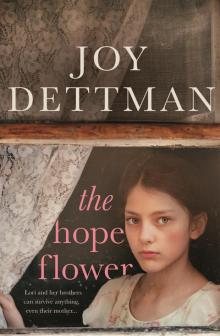 The Hope Flower
The Hope Flower Trails in the Dust
Trails in the Dust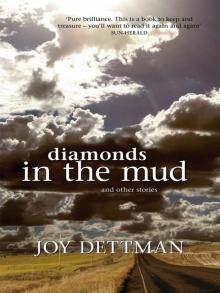 Diamonds in the Mud and Other Stories
Diamonds in the Mud and Other Stories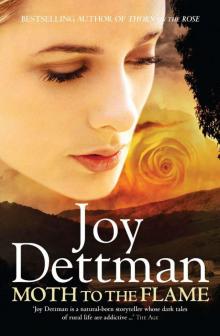 Moth to the Flame
Moth to the Flame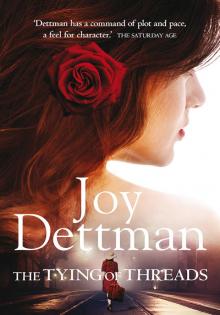 The Tying of Threads
The Tying of Threads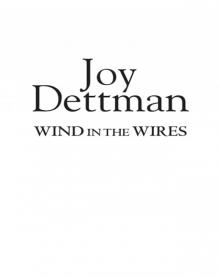 Wind in the Wires
Wind in the Wires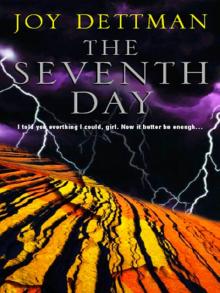 The Seventh Day
The Seventh Day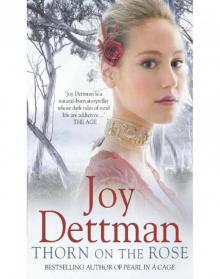 Thorn on the Rose
Thorn on the Rose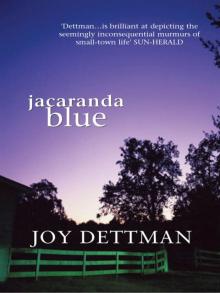 Jacaranda Blue
Jacaranda Blue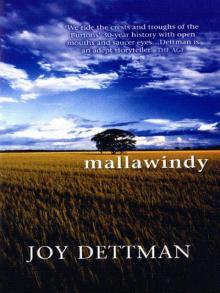 Mallawindy
Mallawindy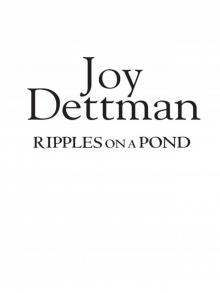 Ripples on a Pond
Ripples on a Pond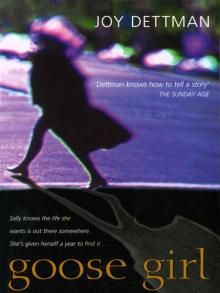 Goose Girl
Goose Girl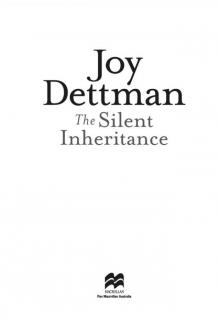 The Silent Inheritance
The Silent Inheritance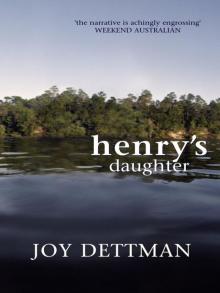 Henry’s Daughter
Henry’s Daughter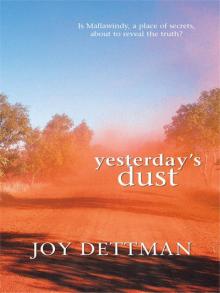 Yesterday's Dust
Yesterday's Dust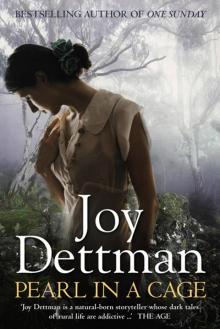 Pearl in a Cage
Pearl in a Cage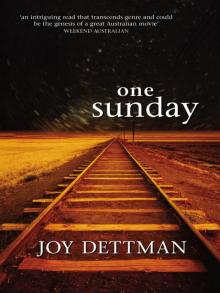 One Sunday
One Sunday